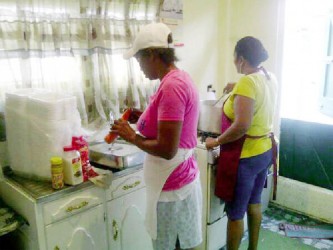Marvin Wray, a final year Public Communications student at the University of Guyana, is not altogether a rookie in the world of business. He has tried his hand at event planning in the past. This time around he has persuaded his mother, an aunt and a handful of friends and relatives to join him in another business venture, Tastebuds Catering and Event Management.
For the past five months, Wray, his mother Annette Wray and her sister Tessa King have been the prime movers behind the business. Still some distance away from being able to meet the salaries of a full-time staff, the operation is supported by a backup group comprising Anthony Gouveia, John Miller, OJ Bourne, Benny Prince and Michael Mikelarry.
To date, Tastebuds has actualized a ‘pickup kitchen’. Once a week, on Fridays, it delivers meals to customers in the city and its environs.

The food industry is a risky one. In Georgetown, the sector has long been crowded by myriad small hustlers boasting the ‘best prices’ and the ‘highest standards of hygiene and nutrition.’ Much of this is hype. Standards range from one extreme to the other, prices are as high as customers would endure and frequently, boasts about nutritional standards cannot stand up to scrutiny.
Tastebuds markets its service around both the accustomed selling points as well as another one – convenience. Every Friday, there is a set menu. Customers telephone in their orders by mid-morning and the meal is delivered by mid-day. The meal costs $1,000.
Up to this time much of the promotion has been done by Facebook and the available evidence suggests that the element of convenience has appealed to public and private sector employees whose lunch breaks are limited to one hour. Regular customers include members of staff of the National Insurance Scheme, the Ministry of Finance, the United States Embassy, the Guyana Revenue Authority, the University of Guyana and teachers at the Bishops’ and St Joseph high schools.
Annette Wray is a key member of ‘Team Tastebuds’. It was her initial investment of $70,000 that got the enterprise started. More than that she brings to the business several years of selling up to 300 dhal puri daily. King once worked for a tourist hotel in Barbados.
Marvin Wray talks about the challenges associated with keeping up with the more established eating houses, like striving to offer a mix of creole dishes and popular restaurant fare. In more ways than one, customers can be demanding, even unforgiving. The first few weeks were an unforgettable experience. On the opening day, 115 lunches were sold. Sometimes there were bad days; lunches were delivered late, some not at all and there were several cancellations. Tastebuds persists. A delivery team is now in place utilizing two cars and a few bicycles.

Five months after the launch, Tastebuds is upbeat about its prospects. The number of orders have increased to around 150 and Wray has begun to develop a longer-term vision for the enterprise. In the medium to long term he envisages mobile ‘pickup kitchens’ at strategic points in the city and its environs. The UG campus is being targeted for the first one by yearend.
In the shorter term Tastebuds will be relocating to Le Rose Hotel and Restaurant. An agreement has been reached with the owners of the hotel under which the management of Tastebuds will invest $2 million in the renovation of the restaurant.
Tastebuds is already steeling itself for the transition to operating a full-time restaurant. Once a week is tough as it is. Preparation for Fridays begins early in the week with menu planning and shopping, mostly at Bourda market. Fruit for the drink of the week comes from the Essequibo Coast. When all has been decided the menu is placed on Facebook.
Wray believes things are looking up. Between 35% and 40% of the clientele are regulars and each week the customer base grows.
A month after launch, Wray attended an Entrepreneurship Speed Challenge competition hosted by the United States Embassy in Georgetown. The project challenged competitors to pitch their business ideas to a panel drawn from the local business sector. He did not win the competition but the exposure afforded him the opportunity to interface with experienced businessmen. Additionally, the idea of commercial bank financing was raised by representatives of commercial banks that attended the event. Up until now, however, Wray has not borrowed from the banking sector.
Efforts to raise capital for expansion have led the team to undertake various fund-raising events including Party-Qs – an expression derived from barbecues, occasional lunch sales and catering jobs for weddings and other events. One event in December sold 400 lunches and even as this interview was being conducted the team was preparing to take to the road on Mash Day.
Ventures such as this one suggest that the balance is shifting from what has long been a preference amongst academically qualified Guyanese for the security of pensionable jobs, mostly in the public sector, to entrepreneurship. Those ventures begin, frequently, with modest sums of capital, mostly family savings. Commercial banks are not inclined to fund such risky pursuits. Eventually, sometimes, these micro and small enterprises, grow into sturdier businesses, making careers and changing lives in the process. Sometimes they flop spectacularly.




